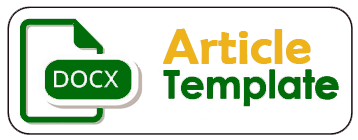PELATIHAN ASESMEN AUTENTIK BAGI GURU SEKOLAH DASAR MUHAMMADIYAH PAKEM SLEMAN
DOI:
https://doi.org/10.47200/gemi.v4i2.2410Keywords:
authenctic assessment, Pakem Muhammadiyah Elementary School, teachers’ knowledgeAbstract
A kind of learning assessments that has not been done by the teachers of Pakem Muhammadiyah Elementary School, Sleman, Special Province of Yogyakarta is authentic assessment. Therefore, training and workshop of authentic assessment were held for the six teachers of 1—6 grades. Before and after the training and workshop were held, the teachers were pretested and postested. The training and workshop were held in forms of lecturing, discussing and designing authentic assessment. Scores of the pretest and postest were analyzed with Wilcoxon Signed-Rank Test. Ho is the training and workshop do not improve the teachers’ knowledge on authentic assessment. Ho is accepted if P-value < 0,05 with α = 0,05. Because of P-value < α, 0,00027 < 0,05, Ho is accepted. It concludes that the training and workshop do not improve the teachers’ knowledge on authentic assessment. It may be caused of limited durance of the training and workshop.
Downloads
References
Archer, M., Morley, D. A., & Souppez, J.-B. R. G. (2021). Real World Learning and Authentic Assessment. Dalam Applied Pedagogies for Higher Education Real World Learning and Innovation across the Curriculum. Palgrave Macmillan. https://doi.org/10.1007/978-3-030-46951-1 © The
Ashford-Rowe, K., Herrington, J., & Brown, C. (2014). Establishing the critical elements that determine authentic assessment. Assessment and Evaluation in Higher Education, 39(2), 205–222. https://doi.org/10.1080/02602938.2013.819566
Fadilla, A. R., Suhardi, S., & Sudiati, S. (2023). Implementasi Penilaian Autentik Bahasa Indonesia Bermuatan Literasi Digital-Industri di SMK dalam Paradigma Kebijakan Edukasi 5.0. Nuansa Akademik: Jurnal Pembangunan Masyarakat, 8(2), 277–298. https://doi.org/10.47200/jnajpm.v8i2.1681
Herrington, J., & Herrington, A. (1998). Authentic assessment and multimedia: How university students respond to a model of authentic assessment. International Journal of Phytoremediation, 21(1), 305–322. https://doi.org/10.1080/0729436980170304
Herrington, J., & Herrington, A. (2006). Authentic conditions for authentic assessment: Aligning task and assessment. Proceedings of the 29th HERDSA Annual Conference.
Herrington, J., & Oliver, R. (2000). An instructional design framework for authentic learning environments. Educational Technology Research and Development, 48(3), 23–48. https://doi.org/10.1007/BF02319856
Litchfield, B. C., & Dempsey, J. V. (2015). Authentic Assessment of Knowledge, Skills, and Attitudes. New Directions for Teaching and Learning, 142. https://doi.org/10.1002/tl.20130
Mueller, J. (2016). Authentic Assessment Toolbox. http://jfmueller.faculty.noctrl.edu/toolbox/index.htm
Prihantoro, A. (2021a). Kegagalan Asesmen Autentik pada Pelajaran Pendidikan Agama Islam di Sekolah Dasar dan Menengah. Ulumuddin: Jurnal Ilmu-ilmu Keislaman, 11(1), 20–54.
Prihantoro, A. (2021b). Kegagalan Pelaksanaan Asesmen Autentik pada Pelajaran Pendidikan Agama Islam Di Sekolah Dasar Dan Menengah. Ulumuddin : Jurnal Ilmu-ilmu Keislaman, 11(1), 29–54. https://doi.org/10.47200/ulumuddin.v11i1.688
Prihantoro, A. (2023). Wawancara dengan Wakil Kepala Sekolah SD Muhammadiyah Pakem Sleman DIY (hlm. 3).
Prihantoro, A., & Hidayat, F. (2019). Melakukan Penelitian Tindakan Kelas. Ulumuddin : Jurnal Ilmu-ilmu Keislaman, 9(1), 49–60. https://doi.org/10.47200/ulumuddin.v9i1.283
Downloads
Published
How to Cite
Issue
Section
License
Copyright (c) 2025 Agung Prihantoro, Taufik Nugroho, Muhammad Nasrudin, Ridwan Nur Hidayat, Aprilia Aprilia

This work is licensed under a Creative Commons Attribution-ShareAlike 4.0 International License.






